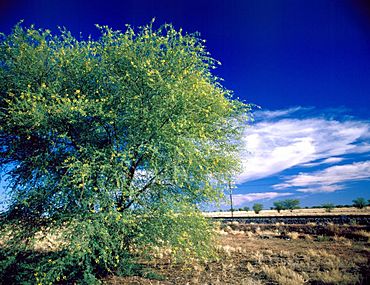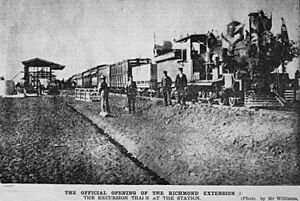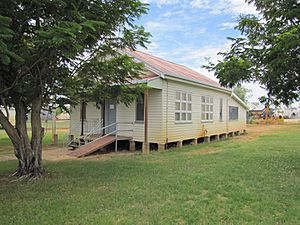Richmond, Queensland facts for kids
Quick facts for kids RichmondQueensland |
|||||||||||||||
|---|---|---|---|---|---|---|---|---|---|---|---|---|---|---|---|

Great Northern railway line near Richmond, 1985
|
|||||||||||||||
| Population | 578 (2021 census) | ||||||||||||||
| • Density | 0.17213/km2 (0.4458/sq mi) | ||||||||||||||
| Postcode(s) | 4822 | ||||||||||||||
| Area | 3,357.9 km2 (1,296.5 sq mi) | ||||||||||||||
| Time zone | AEST (UTC+10:00) | ||||||||||||||
| Location |
|
||||||||||||||
| LGA(s) | Shire of Richmond | ||||||||||||||
| State electorate(s) | Traeger | ||||||||||||||
| Federal Division(s) | Kennedy | ||||||||||||||
|
|||||||||||||||
Richmond is a small country town in Queensland, Australia. It is located in the Shire of Richmond. In 2021, about 578 people lived there. Richmond is also the main town where the local government for the Shire of Richmond is based.
Contents
- Why is Richmond Called Richmond?
- Where is Richmond Located?
- A Quick Look at Richmond's History
- How Many People Live in Richmond?
- Richmond's Special Buildings
- What Does Richmond Do?
- Fun Things to See and Do in Richmond
- Richmond's Facilities
- Education in Richmond
- Richmond's Climate
- Getting Around Richmond
Why is Richmond Called Richmond?
The name Richmond comes from a large farm called Richmond Downs. This farm was started by Arthur Bundock and Walter Hayes. They named it after the Richmond River in New South Wales, where Arthur Bundock was born.
Where is Richmond Located?
Richmond is about 498 kilometers (309 miles) west of Townsville. It is also 406 kilometers (252 miles) east of Mount Isa.
The main road, the Flinders Highway, goes right through Richmond. This highway runs from east to west. The Great Northern railway line also runs through the town. It has a train station called Richmond railway station. There is another small station called Moselle railway station further east.
The Flinders River flows through the area, just west of the town. Another river, the Dutton River, joins the Flinders River nearby.
Two other important roads leave Richmond. The Richmond–Croydon Road goes north-west. The Richmond–Winton Road goes south-west.
A Quick Look at Richmond's History
Early Days and First Explorers
The land around Richmond has been home to Aboriginal people for a very long time. The Jirandali and Wanamarra languages were spoken here.
In 1861, an explorer named Frederick Walker passed through the area. He named the Dutton River. A year later, in 1862, another explorer, William Landsborough, camped where Richmond town is now. Both explorers were looking for the missing Burke and Wills expedition.
How Richmond Downs Began
In 1863, a large farm called Richmond Downs Pastoral Run was set up. It was managed by Wellington Cochrane Bundock and Enoch Price Walter Hays. They came from the Richmond River area in New South Wales.
Gold Rush and Town Growth
In 1880, gold was found north of Richmond, in a place called Woolgar. This made Richmond an important stop for stagecoaches. People traveling to the goldfields would pass through Richmond.
The town of Richmond was officially planned in 1882. The first land lots were sold in 1883.
Schools and Railways Arrive
Richmond Provisional School opened in 1889 with 23 students. It became Richmond State School in 1902.
The Great Northern railway line reached Richmond in June 1904. This was a big event for the town. It helped connect Richmond to other places and made transport easier.
A Catholic primary school was opened in 1915 by the Sisters of St Joseph of the Sacred Heart. The Richmond Public Library opened in 1996.
How Many People Live in Richmond?
The number of people living in Richmond has changed over the years:
- In 2006, there were 554 people.
- In 2011, the population was 522 people.
- In 2016, it grew to 648 people.
- In 2021, the population was 578 people.
Richmond's Special Buildings
Richmond has some buildings that are important because of their history. These are called heritage-listed sites. One example is the St John the Baptist Anglican Church. It was built in 1909 and is located at 55 Crawford Street.
What Does Richmond Do?
Richmond's main jobs are in farming, especially raising sheep and cattle. But tourism is also becoming very important. Many people stop in Richmond when driving along the Flinders Highway.
Also, scientists have found amazing fossils of ancient sea creatures here! Some of these fossils are on display in Richmond, which brings many visitors.
Fun Things to See and Do in Richmond
- Cambridge Downs Heritage Display Centre: This is a copy of an old homestead from the 1860s. It shows what life was like back then.
- Kronosaurus Korner: This is a cool museum where you can see fossils of huge prehistoric marine animals, like the Kronosaurus!
- Lake Fred Tritton: A nice lake where you can relax.
- Richmond War Memorial: A place to remember soldiers.
- Moon Rocks Monument: A unique monument to explore.
Richmond's Facilities
Richmond has many useful places for its residents and visitors:
- A golf course
- A bowling club
- Swimming facilities
- A race course
- A caravan park for travelers
- A tourist information center to help visitors
The Richmond Shire Council runs a public library at 76 Goldring Street. The Richmond branch of the Queensland Country Women's Association also has its rooms at 74 Goldring Street.
Education in Richmond
Richmond State School is a government school for students from Prep (the first year of school) up to Year 10. It teaches both boys and girls. The school is located at 88 Crawford Street. In 2018, about 84 students attended the school.
For students who want to complete Year 11 and 12, there isn't a school in Richmond. They might go to Hughenden State School in Hughenden. Other choices include learning from home through distance education or going to a boarding school.
Richmond's Climate
Richmond has a hot, mostly dry climate. It's on the edge of being a tropical climate. This means it gets very hot, especially in summer.
| Climate data for Richmond Post Office (211 m asl), 1981–2010 normals; extremes since 1893 | |||||||||||||
|---|---|---|---|---|---|---|---|---|---|---|---|---|---|
| Month | Jan | Feb | Mar | Apr | May | Jun | Jul | Aug | Sep | Oct | Nov | Dec | Year |
| Record high °C (°F) | 46.0 (114.8) |
44.0 (111.2) |
42.4 (108.3) |
40.6 (105.1) |
37.8 (100.0) |
34.5 (94.1) |
36.1 (97.0) |
37.3 (99.1) |
40.3 (104.5) |
43.3 (109.9) |
45.5 (113.9) |
46.0 (114.8) |
46.0 (114.8) |
| Mean daily maximum °C (°F) | 36.8 (98.2) |
36.0 (96.8) |
35.4 (95.7) |
33.1 (91.6) |
29.6 (85.3) |
26.4 (79.5) |
26.3 (79.3) |
28.7 (83.7) |
32.7 (90.9) |
36.0 (96.8) |
37.3 (99.1) |
38.1 (100.6) |
33.0 (91.4) |
| Mean daily minimum °C (°F) | 23.6 (74.5) |
23.3 (73.9) |
21.2 (70.2) |
18.1 (64.6) |
14.2 (57.6) |
10.6 (51.1) |
9.5 (49.1) |
11.0 (51.8) |
15.0 (59.0) |
18.9 (66.0) |
21.6 (70.9) |
23.3 (73.9) |
17.5 (63.5) |
| Record low °C (°F) | 13.3 (55.9) |
12.5 (54.5) |
10.6 (51.1) |
3.6 (38.5) |
1.1 (34.0) |
−2.4 (27.7) |
−2.2 (28.0) |
−1.1 (30.0) |
2.2 (36.0) |
4.4 (39.9) |
7.3 (45.1) |
10.2 (50.4) |
−2.4 (27.7) |
| Average precipitation mm (inches) | 139.1 (5.48) |
99.2 (3.91) |
46.3 (1.82) |
30.3 (1.19) |
14.6 (0.57) |
17.8 (0.70) |
11.0 (0.43) |
8.5 (0.33) |
4.6 (0.18) |
16.8 (0.66) |
36.8 (1.45) |
69.4 (2.73) |
492.1 (19.37) |
| Average precipitation days | 9.7 | 8.4 | 4.3 | 2.5 | 1.7 | 1.4 | 1.3 | 1.4 | 0.9 | 2.8 | 5.4 | 6.9 | 46.7 |
| Average afternoon relative humidity (%) | 38 | 41 | 33 | 30 | 31 | 31 | 28 | 23 | 20 | 21 | 25 | 29 | 29 |
| Source: Bureau of Meteorology | |||||||||||||
Getting Around Richmond
- You can fly to Richmond using the Richmond Airport.
| Preceding station | Queensland Rail | Following station | ||
|---|---|---|---|---|
| Long distance rail services | ||||
| Hughenden
towards Townsville
|
The Inlander | Julia Creek
towards Mount Isa
|
||
 | Percy Lavon Julian |
 | Katherine Johnson |
 | George Washington Carver |
 | Annie Easley |




